Signed a Memorandum of
Understanding between
the University of Turin and Ewha Womans
University
during the 1st
Korea-Italy
Joint Seminar on Climate Change
(December 5th, 2007)
On the December 5th,
2007, two Memorandum of Understanding (MoU) between the University of Turin (hereafter, UNITO)
and the Ewha
Womans University (hereafter, EWU) in
Seoul, Korea, have been signed. The first one is a framework agreement
which governs for the next 5 years all present and future collaborations between the two
universities, while the second one is a specific agreement between the Faculty of Science
at the UNITO and the College
of Engineering of EWU,
which regulates the mutual exchange between students and professors.
The two agreements have been signed at the presence of the Korean university President, Prof. Bae-Yong
Lee, of the Italian Embassador in Korea, Massimo
Andrea Leggeri, and of the General Director of the Bureau of
Information and Technology, dr. Yun-Ang Chung. The Rector of the UNITO, Prof. Ezio
Pelizzetti, has sent a video message showing his signing of
agreements, which was shown before the signature ceremony.
The EWU is
the most prestigious Women university and, generally,
one of
the most famous and popular in Korea (I will remember here that, in
Korea, universities are classified according to their rank). It was
founded in 1886 by the American Methodist missionary Mary F.
Scranton, who opened a school of education for Korean women in Seoul, in
the place where now the campus is standing (it
is still visible the first building in which the first classes were
held). The first year there was one student, hence the origin of the
name Womans, to be intended as Woman's. The mission of Mrs.
Scranton,
ambitious, succeeded and allowed the Korean women to begin to
overcome the discrimination against men, typical of the Confucian
society at the end of 1800. Despite the public men were contrary to
this initiative, Emperor Kojong sustained
it and called the school "Ewha" (이화 in Korean), which means "pear
flower",
then giving it an institutional character. This university,
during
the years, developed increasingly, even during the Japanese domination,
to become a focal point of university in the country.
With the signing of
the above MoU, in
particular, the possibility for students of the two universities of
going in the other Country and of following courses is formalized. In practice, it is possible for
an Italian student
to play
a sort of Erasmus in Korea, and vice versa. The agreements do not pose
any constraints on, apart from the number of students per Country per
year, which is ten people. At EWU and
UNITO the educational structure of the university are similar, providing a first level degree (for under-graduate
students),
a master's degree (equivalent to the Italian Laurea Magistralis) and
the PhD. At EWU, few courses of first level and about all courses of the Master and PhD are held in
English language, while at UNITO
few courses of first level, some courses of Laurea Magistralis, and all
courses of PhD are held in English language. With regard to the MoUs
such as those signed with the
UNITO, enrolment is open
to all students,
not only to female students, so the Turinese male students can
go
to the Korean university (not vice versa, because there are no male
students at EWU).
Finally, all students belonging to all levels (including also Post-Doc
students) can benefit of this MoU. The Professors responsible
for the management of the MoU are Prof. Claudio Cassardo
and Prof. Seon-Ki
Park.
A detailed list of Colleges and Faculties
at UNITO and EWU can be found below, as well as a summary table showing the degree courses of 1st
and 2nd (Master) level, and PhD for
both Faculty of
Sciences of UNITO and College
of Engineering of EWU.
It should also be noted that there are some annual scholarships
provided by the Ministries of Foreign Affairs to carry out training
activities abroad (information on this website, in Italian).
The frame of this MoU signature ceremony has
been the 1st
Korea-Italy Joint Seminar on Climate Change, which took place
at the EWU,
incidentally in coincidence with the meeting in Bali. On that occasion,
a "handful" of Italian and Korean researchers met to analyze and
compare their knowledges of the climate system and experiences relating
to its changes at the national scale. The themes of this joint seminar (here
the program)
have ranged from the conceptual and methodological challenges that a
complex system such as the climate poses to the scientific community,
to the analysis of historical results or models that can provide
information on future climate at a national scale in the
respective Countries, and also giving indications of the possible
impacts of these changes on ecosystems and territories.
The event has been organized by the Science and
Technology Office of the Italian
Embassy in Korea (specifically from the scientific
attaché dr. Antonino
Tata), by the Italian
Cultural Institute in Seoul led by dr. Izzo, by the UNITO and by the Severe Storm
Research Center of EWU,
in order to share experiences and methods that could create synergies
between the two Countries, that are certainly different, but that have
common problems, such as, for example, the coast saving, and to conduct
a series of annual meetings in alternate years in the two Countries.
The speakers invited
from Italy have been Dr.
Antonello Pasini, from the Institute of Atmospheric Pollution
of CNR (National Research Council) and Prof. Claudio Cassardo,
professor of Meteorology and of Physics of Climate at
the UNITO. The
Koreans speakers have
been: Dr. Yung-Ang Chung,
General Director of the "Climate and Information Bureau of the Korea
Meteorological Administration", Prof. Seon-Ki
Park, Director of the SSRC of EWU,
and the Prof. Rokjiin J. Park
and Prof. Hoi Chang Ho from
Seoul National University.
The President of EWU, Prof. Bae-Yong
Lee, has
opened
the Seminar with a welcome message in which she
has expressed her satisfaction with the organization of an event that
has proposed the debate on an issue of growing importance, not only for
the
inner character of emergency, but also for the cultural and social
reflections that proposes on the new relation among man and
environment. The seminar, Prof. Lee has continued, is a valuable
opportunity for the deepening of the
phenomenon of climate change and for a definition of the best methods
and models useful to assess the future effects of global changes. She
has also
stressed the importance of the signature of the MoU with the
University of Turin, in order to expand the opportunities for studying
abroad for the two universities.
The Embassador of
Italy in Korea, Massimo
Andrea Leggeri, recalled the
importance of the topic covered by the Seminar also on the plane of the
debate in the major
international meetings, first of all that of the United
Nations. In this regard,
he has recalled the meetings at the highest level organized in 2007 by
the
General Secretary Ban Ki-Moon and, in particular, the
principal, in
Indonesia, Bali, which has token place in concomitance with
this Seminar. He
has recalled the importance attributed to the issues of climate change
within the
G8 since 2006, and that is likely to remain at the center of attention
even under the Japanese presidency of 2008 and the Italian one of 2009.
In recalling that the IPCC (Intergovernmental Panel on Climatic Change), in
its last report (2007), has unequivocally attributed to the human
activities
the responsability for the recent and rapid global warming,
the Ambassador
has expressed the hope that every Country, both under the Kyoto
Protocol,
and in the post-2012, will actively work for a significant reduction of
greenhouse gases released into the atmosphere, and has subsequently
opened the works of the Congress.
The next event has
been the ceremony for the signing of the MoU
(Memorandum of Understanding) between the EWU and the UNITO,
as said before. As the Rector of the UNITO, Prof. Ezio
Pelizzetti, was unable to be present
personally, because of his commitments related to the almost
concurrent
inauguration of the academic year at the UNITO, he has sent a
video containing the greeting to the EWU and its President, the Italian Embassador,
the Lecturers and Researchers present and with the signing of
the
original document, which has been led personally by Prof. Cassardo and
then countersigned by the President of EWU, Prof. Bae-Yong
Lee. Prof. Pelizzetti, in his speech, has also stressed the importance of
this
MoU for both universities and, in general, for the development
of
cooperation between the two Countries, and has promised to
make soon
a visit to Korea. He has also emphasized the importance of the issues
addressed in the Seminar and has suggested that the "II Joint Seminar
Korea-Italy on Climatic Change" will be held in Italy in 2008, possibly
at
the UNITO.
Subsequently,
the proper scientific seminar has begun, in which the complex
field of climate change, the
origin of which depends on both natural cyclical phenomena, and more
and more on the influence of human activities, and in
particular on the
alterations caused by the excessive presence of release into the
atmosphere of greenhouse gases resulting from the consumption of fossil
fuels, has
been dealt with a very
comprehensive and expanded treatment. A key reading of the rapid changes occurred in
recent decades
towards a general warming must be found in a careful, but
critical,
assessment of the atmospheric variations in different geographical
areas
and in the influence of individual physical parameters. The
environmental modeling developed in Italy and Korea represents a
valuable tool for the
interpretation of the phenomena and for a realistic assessment of
the medium and long effects, whose gravity not only physical
but also social and economic is lying at the center of the
international
attention. The Chairman of the Seminar has been Prof. Seon-Ki
Park,
Director of the SSRC of EWU.
The first
speaker, Dr. Yung-Ang Chung, has emphasized the economic relevance
that climate change can have, particularly when they are at the origin
of catastrophic events such as floods, tornadoes, typhoons, etc.. Dr.
Chung as
then presented a summary of the evidences already observed in Korea as
a
result of the recent and rapid evolution of the global climate, with an
emphasis on what is being done now in Korea and what it is expected to
do in the near future concerning the future human activities that might
affect the
climate.
Prof. Rokjin
J. Park has subsequently presented some evaluations on the
influence of ozone and aerosols on human activities and their links
with the climatic variations, because these compounds cause a reduction
in
the incoming solar radiation at the surface. Taking into account the
spatial
and temporal distributions of the concentrations of these important
pollutants and the ability of models in reconstructing their
trends, he has reported
some findings on significant environmental phenomena occurred in Asia
(forest fires in Siberia, dust storms from China, etc.), underlining
the
current criticities of the models and the address of the
future research in this field.
Dr. Antonello Pasini
has discussed the challenges that the study of the
climate system poses to scientific research, stressing the philosophy
and structure of the models (the so-called "virtual laboratory") that
have been developed and still are developing in order to properly
reconstruct
the climate behavior, to understand the fundamental causes that have
led the recent development and to be able to provide its future
development.
He has also presented examples of the expected impacts on global and
regional level over the territory and the ecosystems, and has showed
how the application of models different
from those commonly used for climatic simulations, namely
neural
networks, lead to results very similar to those obtained by
deterministic models used for example from IPCC, suggesting
from one
hand the validity of this approach, and from the other the significant
forcing of the
climate change signal due to anthropogenic causes.
Prof. Hoi Chang Ho has discussed the influence of
human
activities, especially the industrial ones, on climate change, taking
into
consideration the changes of meteorological variables
(temperature, humidity, but
also large-scale circulation and number of typhoons) in eastern Asia
and their correlation with measurements from satellites and
of pollution. The period studied has been the second half of the
twentieth
century. Prof. Ho has also stressed that the Korean data
suggest the
presence of climatic changes in recent times, although the temporal
extension of the dataset is too limited to afford to say this fact with
certainty. Nevertheless, he has also showed that the evidences
founded by examining a recent
Chinese dataset of sufficient temporal extension to cover the
last century have
suggested that climate change is attributable to human activities.
Prof. Claudio Cassardo has evidenced some data and effects of
climate
change taken place in recent years in Italy, focusing on a
particularly sensitive region such as the Alps and
emphasizing some data
of the last two decades. In particular, he has shown as the
regional distribution of the forecasted variations presents
several differences, in
particular for what is concerning the Alpine area, which is
strongly affected by the orientation of the high elevation flows. Prof. Cassardo has also highlighted what effects
the climatic variations predicted by the might have on the
local climate and
water resources. As regards as the latter aspect, he has pointed out
how the
changes envisaged by the models regarding temperature and precipitation
can cause possible reductions in the river flows during the
summer and increase the risk of flooding in the first part
of the spring, due to the anticipation of
the snow melting season and to the decrease of the
surface
covered by ice.
Prof. Seon-Ki
Park has
started his speech by pointing out the vulnerability of the
south-eastern Asian Countries to severe weather events, such as
extratropical cyclones, typhoons or tropical depressions, with the
correlated possibilities of severe rainfall and destructive winds. Then
he has presented some considerations about the possibility to predict
correctly and with a sufficient anticipation those phenomena with the
current models and facilities of the Meteorological Services. Due to
the fact that the predictions of IPCC
for the future climate seem to suggest that such extreme
weather events will increase both in number and in intensity in the
recent future, Prof. Park
has stressed on the necessity of Meteorological Services to improve
their capability and skill of predicting such events. Actually the
scientific community in Korea agrees about the importance of the
regionality in the birth and in the subsequent evolution of such
events, and on the need to develop numerical predictive models strongly
linked with the geo-orographic local conditions, and to improve the
data availability in the regions in which often such phenomena
originate.
The debate which has
followed the relator's speaches has stressed that
climate change can have major repercussions in many areas, and
that a
careful study of the climatology, even at regional scale, which would
allow to take
note of some possible consequences of certain phenomena now already
underway, in order to better plan each future activity, is the most
effective response to the emergencies related to climate change and
global
warming. It has been stressed that only through a continue research in
the
fields of meteorology and climatology, primarily through numerical
modeling, but also in terms of collection and analysis of the available
measurements, we can have the necessary information in order to assess and limit the
damage that each climatic change may produce. Many relators
have mentioned
the IPCC forecasts and the increasingly important role of the public
dissemination of information scientifically correct and understandable
by an enlarged audience. This Seminar has represented an
important
moment for the Italy-Korea collaboration, and has allowed to
highlight
how the scientific skills and capabilities of the two Countries in the
field of meteorology and numerical modeling tools can provide
a real
understanding of a complex system such as
the climate. The seminar has brought also the appreciation
of the Korean scientific community and hopes for
an increased cooperation in the future even through the MoU signed
between EWU
and UNITO have
been expressed. The meeting has been attended by about one hundred
people including students, Professors and common people. At
the end of the
event, as also wished by the UNITO Rector,
Prof. Ezio
Pelizzetti, it has been suggested that the 2nd
Korea-Italy Joint Seminar on Climate Change will be carried out in 2008
at the UNITO.
A small amatorial photo gallery taken during the event
(photos have been taken by Dr. Antonino Tata and by a student of Prof. Seon-Ki Park)
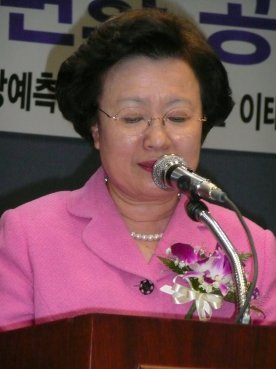
EWU President Prof. Bae-Yong Lee is opening this event by underlining the cultural and social
reflections that these themes propose, and remarking also the importance of the signature of the MoU between EWU and UNITO |
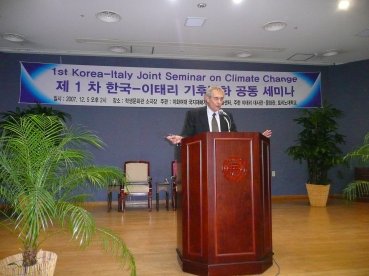
Italian
Embassador in Korea Massimo Andrea Leggeri is highligthing the
importance of the public debate on the climate change and of presenting
the scientific results in such a way that also the general public can
understand these problems |
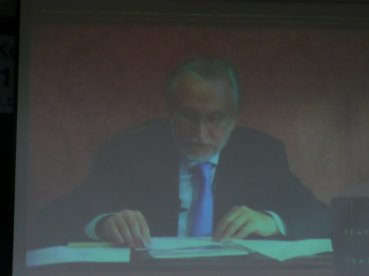
A
frame of the video message of the UNITO Rector Prof. Ezio Pelizzetti.
The audience has followed with great attention his speech, and has
particularly appreciated his attempt to pronounce the greetings in
Korean language |
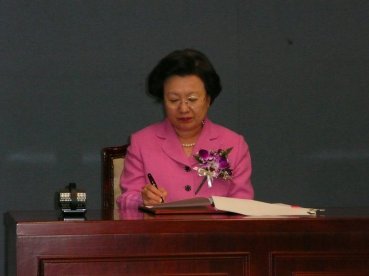
EWU
President Prof. Bae-Yong Lee is countersigning the MoU between EWU and
UNITO, already signed by the UNITO Rector, prof. Ezio Pelizzetti,
during the record of the video message, on November 27, 2007. Since
this moment, the MoU between EWU and UNITO is operative. |
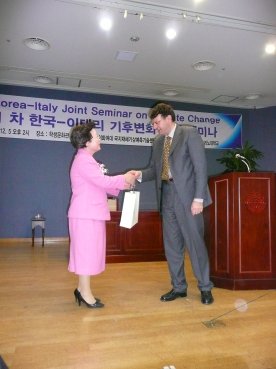
EWU
President, Prof. Bae-Yong Lee, who has already received some presents
from the UNITO Rector, Prof. Ezio Pelizzetti, gives in change some
presents to Prof. Claudio Cassardo |
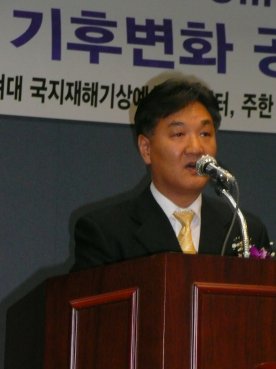
Dr. Yung-Ang Chung is presenting a summary of the evidences of global warming already observed in Korea, highligthing their economic impacts |
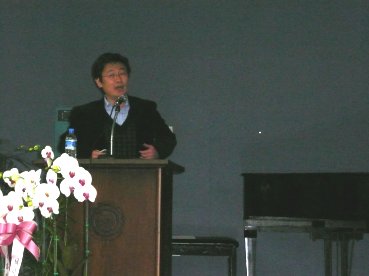
Prof. Rokjin
J. Park is talking about the effects of the forest fires recently
occurred in Siberia on the radiative balance in the lower and higher
atmosphere |
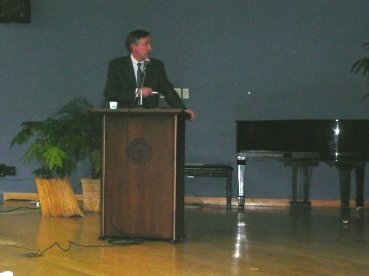
Dr.
Antonello Pasini is showing as the results of his neural network model
can reproduce well the temperature trend in the last 150 years |
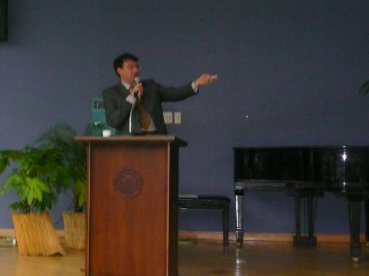
Prof. Claudio Cassardo is showing the values diagnosed by his model LSPM during the 2003 summer heat wave |
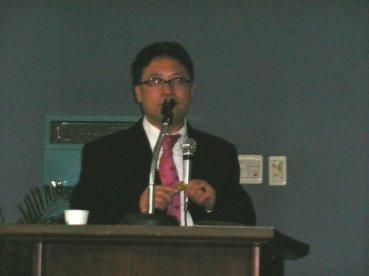
Prof. Seon-Ki Park is highligthing the importance of the initial data in forecasting the typhoons trajectories |
|
|
Educational offer at the EWU and at the UNITO
|
Liberal Arts
|
Social Sciences
|
Natural Sciences
|
Engineering
|
Music
|
Arts and Design
|
Human Movement and Performance
|
Education
|
|
Law
|
Business Administration
|
Medicine
|
Nursing Science
|
Pharmacy
|
Human Ecology
|
Division of International Studies
|
|
Table I - List of Colleges at
the EWU
|
College
of Engineering
|
|
Division of Computer Information Communication
|
Division of Architecture
|
Division of Environmental and Food Technology
|
|
Computer Information Communication Engineering
|
Architecture Design (5 year degree)
|
Architecture Design (4 year degree)
|
Environmental Science and Engineering
|
Food Science and Technology
|
Table II - List of Divisions and Programs at the College
of Engineering of EWU
|
Agrarian
|
Economy
|
Pharmacy
|
Law
|
|
Literature and Philosophy
|
Language and Foreign Literature
|
Medicine and Surgery
|
Veterinary Medicine
|
|
Psychology
|
Formation Science
|
Sciences
|
Political Sciences
|
Table III - List of Faculties at
the UNITO
|
3-years graduations (Undergraduate courses)
|
Laurea magistralis (Master)
|
1st level Master
|
PhD
|
|
Chemistry
|
Vegetal biology
|
Computational logic
|
Bioinformatics
|
Science and High Technology
|
|
Industrial chemistry
|
Environment and work biology
|
Mathematics
|
Technology and Applications of ERP Systems
– Enterprise Resource Planning
|
|
|
Physics
|
Sanitary biology
|
Material sciences
|
Technology and Multimedial Communication
|
|
|
Computer Science
|
Naurobiology
|
Forensic and sport clinic chemistry
|
Project of sites accessibile for Public
Administration
|
|
|
Mathematics
|
Biomolecular sciences
|
Environment and cultural beings chemistry
|
Tecnologies of web security and networking
|
|
|
Optics and Optometry
|
Conservation and animal biodiversity
|
Advanced chemical methodologies
|
|
|
|
Material Sciences
|
Industrial biotechnologies
|
Astrophysics and cosmic physics
|
|
|
|
Sciences and Technologies for the Cultural
Beings
|
Sciences and technologies for the cultural
beings
|
Environment analysis and management
|
|
|
|
Biological Sciences
|
Physics of fundamental interactions
|
Evolution and diversity in the natural systems
|
|
|
|
Geological Sciences
|
Environmental and biomedical physics
|
Evolution of the animal and human behavior
|
|
|
|
Natural Sciences
|
Physics of advanced technologies
|
Industrial chemistry
|
|
|
|
Virtual reality and multimediality
|
Geological sciences
|
|
|
|
Systems for the information treatment
|
Environmental and applied geology
|
|
|
|
Informatic methodologies and systems
|
|
|
|
Table IV - List of educational offer at the Faculty of Sciences
of UNITO
Media reports









